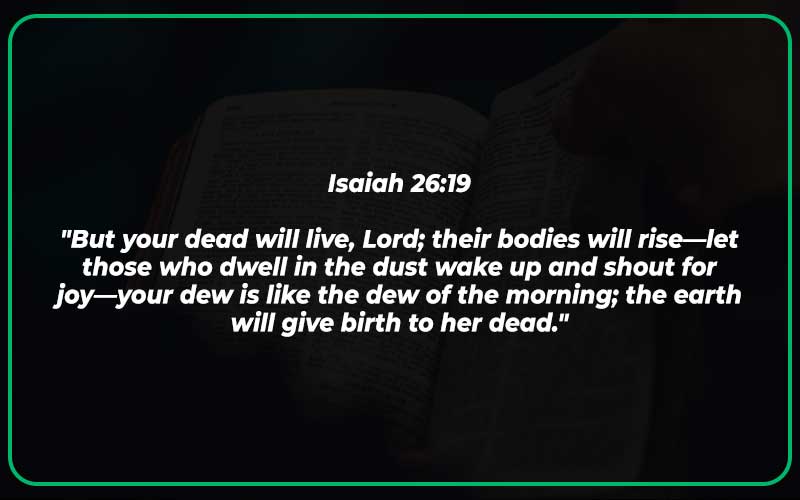Flowers are not only beautiful creations of nature but also hold spiritual symbolism in the Bible. They serve as reminders of God’s faithfulness, beauty, and provision. Join me as we explore some captivating Bible verses about flowers and uncover the profound spiritual truths they reveal.
Also Read: Bible Verses About Confidence
Bible Verses About Flowers
Matthew 6:28-29
“And why do you worry about clothes? See how the flowers of the field grow. They do not labor or spin. Yet I tell you that not even Solomon in all his splendor was dressed like one of these.”
In this passage, Jesus uses the example of flowers to teach about the futility of worry and anxiety. He highlights how the beauty and splendor of the flowers demonstrate God’s provision and care for His creation.
Psalm 103:15-16
“As for man, his days are like grass; he flourishes like a flower of the field; for the wind passes over it, and it is gone, and its place knows it no more.”
In this psalm, the writer compares human life to that of a flower. It emphasizes the fleeting nature of life and the brevity of our time on earth. It serves as a reminder to make the most of the time we have and to focus on what is truly important.
Isaiah 40:8
“The grass withers and the flowers fall, but the word of our God endures forever.”
Isaiah contrasts the temporary nature of flowers with the eternality of God’s Word. It reminds us that while the beauty of flowers may fade, God’s truth and promises remain steadfast.
Song of Solomon 2:1
“I am a rose of Sharon, a lily of the valleys.”
The beloved in this love poem compares herself to a flower, using the imagery to describe her own beauty and delicacy. It serves as a reminder that we are fearfully and wonderfully made by our Creator.
Luke 12:27
“Consider how the wild flowers grow. They do not labor or spin. Yet I tell you, not even Solomon in all his splendor was dressed like one of these.”
Similar to the passage in Matthew 6, Jesus uses the example of flowers to teach about God’s provision and care for His creation. He encourages us to trust in God’s provision rather than worrying about material things.
James 1:10-11
“But the rich should take pride in their humiliation—since they will pass away like a wild flower. For the sun rises with scorching heat and withers the plant; its blossom falls and its beauty is destroyed. In the same way, the rich will fade away even while they go about their business.”
James uses the metaphor of a wild flower to contrast the temporary nature of wealth with the eternal value of faith in God. It serves as a reminder to not put our trust in material possessions, which will ultimately fade away, but to focus on what truly matters.
Proverbs 31:30
“Charm is deceptive, and beauty is fleeting; but a woman who fears the LORD is to be praised.”
This passage emphasizes the value of inner beauty over outward appearance. It serves as a reminder that physical beauty is temporary and fleeting, but a heart devoted to the Lord is truly precious.

1 Peter 1:24-25
“All people are like grass, and all their glory is like the flowers of the field; the grass withers and the flowers fall, but the word of the Lord endures forever.”
Peter uses the imagery of flowers to emphasize the temporary nature of earthly things compared to the eternal value of God’s Word. It serves as a reminder to focus on what will last for all eternity.
Psalm 92:12-14
“The righteous will flourish like a palm tree, they will grow like a cedar of Lebanon; planted in the house of the LORD, they will flourish in the courts of our God. They will still bear fruit in old age, they will stay fresh and green.”
While not specifically referencing flowers, this passage uses plant imagery to describe the flourishing nature of those who trust in the Lord. It highlights how our lives can bear fruit and remain vibrant even into our old age when rooted in God’s love and grace.
Isaiah 35:1-2
“The wilderness and the dry land shall be glad; the desert shall rejoice and blossom like the crocus; it shall blossom abundantly and rejoice with joy and singing.”
Isaiah uses the imagery of flowers to describe the joy and abundance that will come when God’s Kingdom comes to earth. It serves as a hopeful reminder of the future restoration and renewal that awaits us.
Job 14:1-2
“Mortals, born of woman, are of few days and full of trouble. They spring up like flowers and wither away; like fleeting shadows, they do not endure.”
This passage highlights the temporary and fleeting nature of human life, comparing it to the fading beauty of flowers. It serves as a reminder to make the most of the time we have and to focus on what truly matters.
Psalm 103:13-16
“As a father has compassion on his children, so the Lord has compassion on those who fear him; for he knows how we are formed, he remembers that we are dust. The life of mortals is like grass, they flourish like a flower of the field; the wind blows over it and it is gone, and its place remembers it no more.”
This psalm emphasizes the compassion and empathy of God for His creation, even in our temporary and fleeting nature. It serves as a reminder to trust in God’s love and care for us, even in the midst of difficult times.
Isaiah 61:3
“…to grant to those who mourn in Zion—to give them a beautiful headdress instead of ashes, the oil of gladness instead of mourning, the garment of praise instead of a faint spirit; that they may be called oaks of righteousness, the planting of the Lord, that he may be glorified.”
While not specifically referencing flowers, this passage uses plant imagery to describe the transformation and renewal that comes when we turn to God in our times of mourning and need. It serves as a hopeful reminder of the healing and restoration that awaits us when we trust in God’s love and care for us.
1 Corinthians 15:35-37
“But someone will ask, “How are the dead raised? With what kind of body do they come?” You foolish person! What you sow does not come to life unless it dies. And what you sow is not the body that is to be, but a bare kernel, perhaps of wheat or of some other grain.”
Paul uses the metaphor of a seed growing into a plant to describe the resurrection of the body. It serves as a reminder of the hope and promise of eternal life that is available to us through faith in Christ.
Revelation 22:1-2
“Then the angel showed me the river of the water of life, as clear as crystal, flowing from the throne of God and of the Lamb down the middle of the great street of the city. On each side of the river stood the tree of life, bearing twelve crops of fruit, yielding its fruit every month. And the leaves of the tree are for the healing of the nations.”
While not specifically mentioning flowers, this passage describes the beauty and abundance of the restored creation in heaven. It serves as a hopeful reminder of the future that awaits us as believers in Christ.
Psalm 119:105
“Your word is a lamp to my feet and a light to my path.”
While not directly referencing flowers, this passage emphasizes the importance and value of God’s Word. It serves as a reminder that just as flowers need sunlight to grow and thrive, our souls need the nourishment and guidance of God’s Word to flourish.
Isaiah 26:19
“But your dead will live, Lord; their bodies will rise—let those who dwell in the dust wake up and shout for joy—your dew is like the dew of the morning; the earth will give birth to her dead.”
While not specifically referencing flowers, this passage describes the hope and promise of the resurrection of the body. It serves as a reminder of the ultimate victory over death that is available to us through faith in Christ.

What does the Bible say about flowers?
The Bible contains various references to flowers, often using them symbolically or as metaphors to convey deeper spiritual and moral messages. Throughout the text, flowers are used to illustrate different aspects of life, faith, and God’s creation. Here are some common themes associated with flowers in the Bible:
- Beauty and Transience: Flowers are often portrayed as beautiful and transient, emphasizing the fleeting nature of human life. They serve as a reminder that life is temporary, and we should appreciate the beauty around us.
- God’s Creation: The Bible frequently refers to flowers as part of God’s creation. They are seen as evidence of God’s creativity and attention to detail in designing the natural world.
- Provision and Care: Jesus used flowers, particularly lilies, to illustrate God’s care and provision for His creation. In Matthew 6:28-30, Jesus tells his disciples not to worry about their material needs, using the example of how God clothes the flowers in the field, despite their short existence.
- Symbolism of Growth and Renewal: Flowers symbolize growth, renewal, and resurrection. Just as a flower emerges from a seed and blooms, the Bible teaches about the resurrection of believers and the promise of eternal life.
- Fragrance and Offering: The Bible mentions the fragrance of flowers as a metaphor for the pleasing aroma of offerings to God. Believers are encouraged to live lives that are pleasing to God, likened to the sweet scent of a fragrant flower.
- Spiritual Lessons: Parables and stories in the Bible often use flowers and plants to convey moral and spiritual lessons. For instance, the parable of the sower in Matthew 13 uses seeds and different types of soil to represent various responses to God’s message.
- Humility and Simplicity: Flowers are often associated with humility and simplicity, reflecting the virtues encouraged in believers’ lives.
While the Bible does not have an extensive botanical focus, the symbolism and metaphorical usage of flowers provide valuable insights into various aspects of faith and human existence. Each reference to flowers carries its own significance and contributes to the rich tapestry of biblical teachings.

